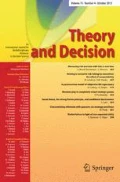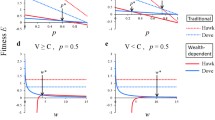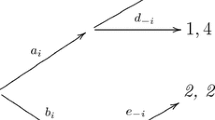Abstract
The objective of this article is to investigate the impact of agent heterogeneity (as regards their attitude towards cooperation) and payoff structure on cooperative behaviour, using an experimental setting with incomplete information. A game of chicken is played considering two types of agents: ‘unconditional cooperators’, who always cooperate, and ‘strategic cooperators’, who do not cooperate unless it is in their interest to do so. Overall, our data show a much higher propensity to cooperate than predicted by theory. They also suggest that agent heterogeneity matters: the higher the proportion of ‘strategic cooperators’ in the population, the higher their probability to cooperate. Finally, our data confirm that higher rewards to cooperation (embedded in the payoff structure) tend to lower defection. Taken together, our results suggest that the subjects might be non-expected utility maximizers, dealing with both outcomes and probabilities in a non-linear manner.
Similar content being viewed by others
References
Baron J. (2008) Social dilemmas: cooperation versus defection in thinking and deciding, 4th Ed. Cambridge University Press, Cambridge, UK
Berg J., Dickhaut J. W., McCabe K. A. (1995) Trust, reciprocity and social history. Games and Economic Behavior 10: 122–142
Bohnet I., Greig F., Herrmann B., Zeckhauser R. (2008) Betrayal aversion: Evidence from Brazil, China, Oman, Switzerland, Turkey and the United States. American Economic Review 98: 294–310
Bohnet I., Zeckhauser R. (2004) Trust, risk and betrayal. Journal of Economic Behavior and Organization 55: 467–484
Bolton G., Ockenfels A. (2000) A theory of equity, reciprocity and competition. American Economic Review 90: 166–193
Boone C., de Brabander B., van Witteloostuijn A. (1999) The impact of personality on behavior in five prisoner’s dilemma games. Journal of Economic Psychology 20: 343–377
Boone C., Witteloostuijn A. (1999) Competitive and opportunistic behavior in a prisoner’s dilemma game: experimental evidence on the impact of culture and education. Scandinavian Journal of Management 15: 333–350
Brennan G., Gonzalez L. G., Güth W., Levati M. V. (2008) Attitudes toward private and collective risk in individual and strategic choice situations. Journal of Economic Behavior and Organization 67: 253–262
Cabon-Dhersin M.-L., Ramani S. V. (2007) Opportunism, trust and cooperation: A game theoretic approach with heterogeneous agents. Rationality and Society 79: 203–228
Camerer C. (1995) Individual decision making. In: Kagel J., Roth A. E. (eds) Handbook of experimental economics. Princeton University Press, Princeton
Camerer C. (2003) Behavioral game theory: Experimental studies of strategic interaction. Princeton University Press, Princeton
Carraro C., Siniscalco D. (1993) Strategies for the international protection of the environment. Journal of public Economics 52: 309–328
Charness G., Rabin M. (2002) Understanding social preferences with simple tests. Quarterly Journal of Economics 117: 817–869
Dawes R. M., Thaler R. H. (1988) Cooperation. Journal of Economic Perspectives 2(3): 187–197
Dawes R. M., Vande Kragt A. J., Orbell J. M. (1988) Not me or thee but we: The importance of group identity in eliciting cooperation in dilemma situations: Experimental manipulations. Acta Psychologica 68: 83–97
Dolbear F. T., Lave L. B. (1966) Risk orientation as a predictor in the prisoner’s dilemma. Journal of Conflict Resolution 10: 506–515
Eckel C. C., Wilson R. K. (2004) Is trust a risky decision?. Journal of Economic Behavior and Organization 55: 447–465
Erlei M. (2008) Heterogeneous social preferences. Journal of Economic Behavior and Organization 65: 436–457
Falk A., Fischbacher U. (2006) A theory of reciprocity. Games and Economic Behavior 54: 293–315
Fehr E., Fischbacher U. (2002) Why social preferences matter—The impact of non-selfish motives on competition, cooperation and incentives. Economic Journal 112((478): C1–C33
Fehr E., Gächter S. (2000) Fairness and retaliation: The economics of reciprocity. Journal of Economic Perspectives 14: 159–181
Fehr E., Schmidt K. (1999) A theory of fairness, competition, and cooperation. Quarterly Journal of Economics 3: 817–868
Friedman M., Savage L. J. (1948) The utility analysis of choices involving risk. Journal of Political Economy 56: 279–304
Gächter S., Herrmann B., Thöni C. (2004) Trust, voluntary cooperation, and socio-economic background: Survey and experimental evidence. Journal of Economic Behavior and Organization 55: 505–531
Goeree J. K., Holt C. A. (2001) Ten little treasures of game theory and ten intuitive contradictions. American Economic Review 91: 1402–1422
Güth W., Ockenfels P., Wendel M. (1997) Cooperation based on trust: An experimental investigation. Journal of Economic Psychology 18: 18–43
Hardin R. (1971) Collective action as an agreeable N-prisoners’ dilemma. Science 16: 472–481
Kahneman D., Tversky A. (1979) Prospect theory: An analysis of decisions under risk. Econometrica 47: 313–327
Kollock P. (1998a) Social dilemmas: The anatomy of cooperation. Annual Review of Sociology 24: 183–214
Kollock P. (1998b) Transforming social dilemmas: Group identity and cooperation. In: Danielson P. (eds) Modelling rational and moral agents. Oxford University Press, Oxford, pp 186–210
Levine D. (1998) Modeling altruism and spitefulness in experiments. Review of Economic Dynamics 1: 593–622
Lönnqvist J.-E., Verkasalo M., Walkowitz G., Wichardt P. C. (2009) How to measure individual risk taking? An experimental inquiry. University of Helsinky and University of Bonn, Helsinky and Bonn
McClintock C. G., Liebrand W. B. G. (1988) Role of interdependence structure, individual value orientation, and another’s strategy in social decision making: A transformational analysis. Journal of Personality and Social Psychology 55: 396–409
Neugebauer T., Poulsen A., Schram A. (2008) Fairness and reciprocity in the Hawk-Dove game. Journal of Economic Behavior and Organization 66(2): 243–250
Poppe M. (2005) The specificity of social dilemma situations. Journal of Economic Psychology 26: 431–441
Rabin M. (1993) Incorporating fairness into game theory and economics. American Economic Review 83: 1281–1302
Ridley M. (1997) The origins of virtue: Human instincts and the evolution of cooperation. Viking Penguin, New York
Sabater-Grande G., Georgantzis G. (2002) Accounting for risk aversion in repeated prisoners’ dilemma games: An experimental test. Journal of Economic Behavior and Organization 48: 37–50
Sherman R. (1969) Risk attitude and cost variability in a capacity choice experiment. Review of Economic Studies 36: 453–466
Simpson B. (2006) Social identity and cooperation in social dilemmas. Rationality and Society 18: 443–470
Snyder G. H. (1971) Prisoner’s dilemma and chicken models in international politics. International Studies Quarterly 15: 66–103
Starmer C. (1999) Experiments in economics: Should we trust the dismal scientists in white coats?. Journal of Economic Methodology 6(1): 1–30
Starmer C. (2000) Developments in non-expected utility theory: The hunt for a descriptive theory of choice under risk. Journal of Economic Literature 38: 332–382
Stone R. W. (2001) The use and abuse of game theory in international relations: The theory of moves. Journal of Conflict Resolution 45: 216–244
Thogersen J. (2008) Social norms and cooperation in real-life social dilemmas. Journal of Economic Psychology 29(4): 458–472
Turner J. C., Hogg M. A., Oakes P. J., Reicher S. D., Weetherell M. S. (1987) Rediscovering the social group: A self-categorization theory. Basil Blackwell, Oxford
Tversky A., Kahneman D. (1992) Advances in prospect theory: Cumulative representation of uncertainty. Journal of Risk and Uncertainty 5: 297–323
Wagenaar W. A., Keren G. B., Lichtenstein S. (1988) Islanders and hostages: Deep and surface structures of decision problems. Acta Psychologica 67: 175–188
Ward H. (1993) Game theory and the politics of the global commons. Journal of Conflict Resolution 37: 203–235
Wit A. P., Wilke H. A. M. (1992) The effect of social categorization on cooperation in three types of social dilemmas. Journal of Economic Psychology 13: 135–151
Yamagishi T., Kiyonari T. (2000) The group as the container of generalized reciprocity. Social Psychology Quarterly 63: 116–132
Author information
Authors and Affiliations
Corresponding author
Rights and permissions
About this article
Cite this article
Cabon-Dhersin, ML., Etchart-Vincent, N. The puzzle of cooperation in a game of chicken: an experimental study. Theory Decis 72, 65–87 (2012). https://doi.org/10.1007/s11238-010-9220-9
Published:
Issue Date:
DOI: https://doi.org/10.1007/s11238-010-9220-9




